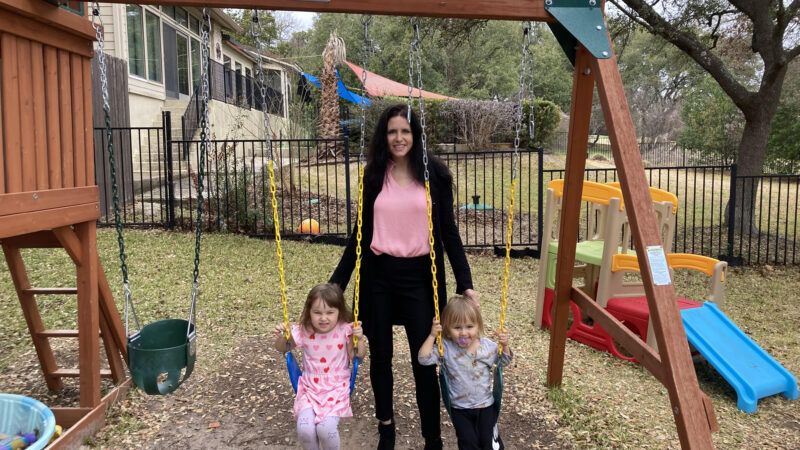Texas Town Shuts Down Her Home Day Care After Nearby Golfers Complain the Kids Were Making Too Much Noise
Bianca King argues in a new lawsuit that Lakeway, Texas, zoning officials illegally deprived her of her right to earn a living by denying her a permit for her home day care business.

A woman is suing the city of Lakeway, Texas, after it ordered her to shut down her home day care business at the behest of golfers who complained that the sounds and sights of children in her yard were throwing off their game.
Bianca King claims in a lawsuit filed on Tuesday in District Court of Travis County, Texas, that Lakeway zoning officials violated her rights under the Texas Constitution to economic liberty and peaceful assembly when they illegally denied her a home occupation permit for her day care business.
"If Bianca were babysitting her friends' and neighbors' kids for free, the city couldn't do anything to stop her," said Erica Smith Ewing, an attorney with the Institute for Justice, which is representing King, in a press release. "There's no reason they should be able to shut her down simply because she makes a living doing so."
King, a single mother of two, moved to Lakeway from California in 2020 with the express purpose of starting a day care business. Her complaint notes that she went obtained all the needed certifications and underwent inspections required by Texas state law to allow her to care for up to four children at a time. Her day care business opened in January. She'll typically take care of between two and four neighborhood children, in addition to her own, during weekday business hours.
Kings' business proved uncontroversial for its first few months. Trouble started in August 2021 when she received a call from a Lakeway code enforcement officer telling her that someone had complained about her business. She was told that she was operating an illegal home occupation and that she'd need to obtain a "special use permit" to come into compliance.
Code enforcement told King, per her lawsuit, that getting that permit should be a straightforward, administrative process; she'd just have to cross a few Ts on an application. But soon after filing her application in September, she was told that she'd have to make the case for her business at a public hearing before the city's Zoning and Planning Commission.
The public hearing process gave critics of King's business the opportunity to complain about it. And complain they did. At a November zoning commission hearing on King's permit application, former Lakeway Mayor Joe Bain complained that children's toys in King's yard were visible from the adjacent private golf course he played on. He also said that the sounds made by kids playing in her yard were also a disturbance.
"When you walk or drive by…you can see the kids out playing, which is fine, but there is a noise issue," said Bain at the hearing.
Those complaints proved persuasive enough that the commission voted 4-1 to deny King her permit.
Her appeal to Lakeway's Board of Adjustments went no better. That appeal required a second public hearing where Bain and several other golfers reupped complaints about the noise and distraction caused by King's day care. There was support for King's application. Lakeway's current mayor spoke in her favor, arguing that the city's home occupation law was nearly impossible to comply with.
That wasn't enough, however. The Board of Adjustment voted last week to deny King's application, saying in a written decision that her day care business violated Lakeway's requirements that home occupations be "undetectable" to the public and that there aren't customers commuting to the house.
Left with no other options for appeal, and facing daily $2,000 fines if she kept her day care open, King sued.
She argues that 19 different requirements of Lakeway's home business law—which also bans everything from regular deliveries to keeping merchandise on site—is "is one of the most oppressive home-occupation ordinances in the state and even the country."
Her lawsuit argues that merely having children play in her yard isn't enough to make day care a detectable business, given that kids playing outside is a normal, unregulated part of suburban life.
Shutting down the business, despite its negligible impact on neighboring property owners, violates a number of the Texas Constitution's protections of private property and peaceable assembly, the complaint continues.
King is asking the court to reverse Lakeway's decision and let her operate her day care in peace.
Millions of Americans, like King, started working remotely during the pandemic. People bringing business inside the home often run afoul of local rules forbidding or strictly regulating what people can do for pay inside their own property.
The rise of remote work has led some cities to start loosening their home business regulations. That's been a slow, uneven process, however. And not all cities are eager to start allowing even the most innocuous commercial activity in residential neighborhoods.
Lakeway's crackdown on King's business is regrettably par for the course.
Rent Free is a weekly newsletter from Christian Britschgi on urbanism and the fight for less regulation, more housing, more property rights, and more freedom in America's cities.


Show Comments (120)